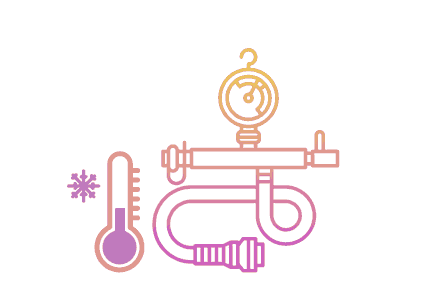Central Texas residents usually have one of three types of HVAC systems installed: an air conditioning system plus furnace, a heat pump, or a dual setup that combines a heat pump with a furnace.
Your HVAC unit requires a refrigerant like Puron (or in older systems, Freon) to provide cooling during the summer and, depending on your installation, heating throughout the winter. Air conditioners need coolant to transfer hot air out of your home and release newly cooled air into your vents. Heat pump systems use coolant to do exactly the opposite, releasing warm air inside while transferring cold air to the outside.
How is Refrigerant Used in a Home AC?
On a very basic level, your AC works by taking hot air from inside your home and releasing it outside. Air conditioners need coolant to do this. The coolant cycles through your AC’s coils at high and low pressures, thereby changing states and temperatures. Cold refrigerant absorbs heat while heated refrigerant releases it.
While it’s logical to associate HVAC coolant with cooling, coolant is vital year-round for homeowners who have heat pumps installed. In the summertime, a heat pump works like an air conditioner by using circulating coolant to capture heat from the inside of your home and releasing it to the outside. In the winter time, the flow of coolant is reversed to achieve the opposite effect.
How Long Does HVAC Refrigerant Last?
During the cooling cycle, refrigerant never gets used up. The refrigerant inside your HVAC system will always remain at the same level – unless you have a coolant leak.
Signs of a Coolant Leak
A leak will cause the refrigerant “charge” to drop, leading to the issues such as poor heating or cooling,
higher humidity in the home, frozen coils, hissing noises, and higher-than-normal energy bills.
A coolant leak is a serious problem. Low refrigerant levels will not only hamper HVAC efficiency, they can severely damage your compressor in the process.
My AC or Heat Pump is Underperforming. Is it the Coolant?
In order for coolant to do its job, various other parts and components within your AC or heat pump need to be maintained as well. Among other things, your unit requires unobstructed airflow, a blower fan and motor, clean evaporator and condenser coils, a functioning capacitor, and a compressor. When these things are compromised, you may experience symptoms similar to those of a coolant leak.
Regular Maintenance Prevents Leaks & Subsequent Breakdowns
During preventative maintenance, we thoroughly inspect parts and connections, check coolant components and adjust the refrigerant profile, inspect the coils, and check your air filters. We’ll monitor your compressor’s starting amps and operating temperatures, ensure your motor’s running amps are correct, and test all relays, controls, and transformers. We’ll also inspect the fan and fan motor, check the thermostat, inspect your drain lines, inspect all wiring and connections, and check all circuit boards for burn marks or corrosion.
Learn More About Maintenance & Schedule An Appointment Today!

